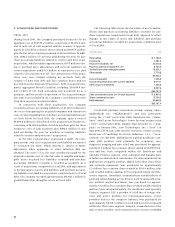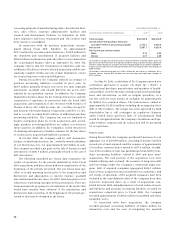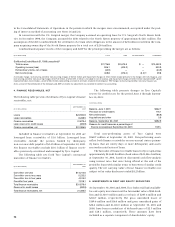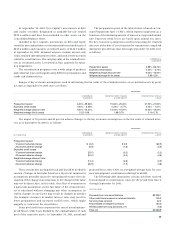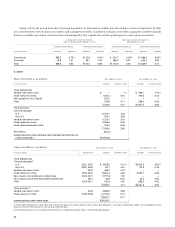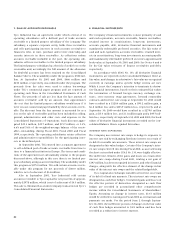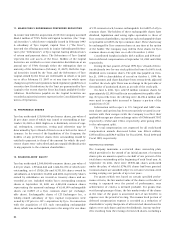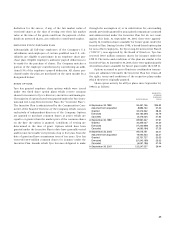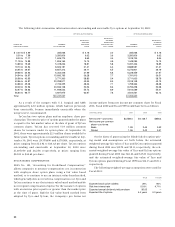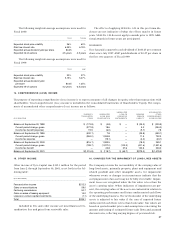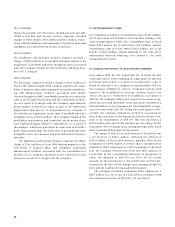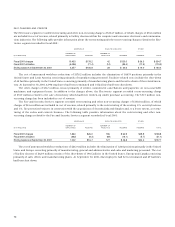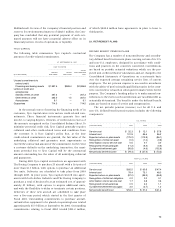ADT 2001 Annual Report Download - page 66
Download and view the complete annual report
Please find page 66 of the 2001 ADT annual report below. You can navigate through the pages in the report by either clicking on the pages listed below, or by using the keyword search tool below to find specific information within the annual report.
64
11. MANDATORILY REDEEMABLE PREFERRED SECURITIES
In connection with the acquisition of CIT, the Company assumed
$260.0 million of 7.70% Preferred Capital Securities (the “Capi-
tal Securities”), which were originally issued in February 1997.
A subsidiary of Tyco Capital, Capital Trust I (“The Trust”),
invested the offering proceeds in Junior Subordinated Deben-
tures (the “Debentures”) of Tyco Capital, having identical rates
of return and payment dates. The Debentures of Tyco Capital
represent the sole assets of the Trust. Holders of the Capital
Securities are entitled to receive cumulative distributions at an
annual rate of 7.70% through either the redemption date or
maturity of the Debentures (February 15, 2027). Both the Capi-
tal Securities issued by the Trust and the Debentures of Tyco
Capital owned by the Trust are redeemable in whole or in part
on or after February 15, 2007 or at any time in whole upon
changes in specific tax legislation, bank regulatory guidelines or
securities law. Distributions by the Trust are guaranteed by Tyco
Capital to the extent that the Trust has funds available for dis-
tribution. Distributions payable on the Capital Securities are
recorded as minority interest expense in the Consolidated State-
ments of Operations.
12. PREFERENCE SHARES
Tyco has authorized 125,000,000 preference shares, par value of
$1 per share, none of which was issued or outstanding at Sep-
tember 30, 2001 or 2000. Rights as to dividends, return of capi-
tal, redemption, conversion, voting and otherwise may be
determined by Tyco’s Board of Directors on or before the time of
issuance. In the event of the liquidation of the Company, the
holders of any preference shares then outstanding would be
entitled to payment to them of the amount for which the pref-
erence shares were subscribed and any unpaid dividends prior
to any payment to the common shareholders.
13. SHAREHOLDERS’ EQUITY
Tyco has authorized 2,500,000,000 common shares, par value of
$.20 per share, 1,935,464,840 and 1,684,511,070 of which were
outstanding, net of 17,026,256 and 31,551,310 shares owned by
subsidiaries, at September 30, 2001 and 2000, respectively. Shares
owned by subsidiaries are treated as treasury shares and are
recorded at cost. Included within Tyco’s outstanding common
shares at September 30, 2001 are 4,243,108 common shares
representing the assumed exchange of 6,143,199 exchangeable
shares (at 0.6907 of a Tyco common share per exchange-
able share). Exchangeable shares of CIT Exchangeco Inc., a
wholly-owned subsidiary of Tyco Capital Corporation were
issued by CIT prior to CIT’s acquisition by Tyco. In connection
with the acquisition of CIT, each outstanding exchangeable
share, which was exchangeable prior to the merger for one share
of CIT common stock, became exchangeable for 0.6907 of a Tyco
common share. The holders of these exchangeable shares have
dividend, liquidation and voting rights equivalent to those of
Tyco common shareholders, except that each exchangeable share
is equivalent to 0.6907 of a Tyco common share. These shares may
be exchanged for Tyco common shares at any time at the option
of the holder. The Company may redeem these shares for Tyco
common shares at any time on or after November 1, 2004.
Contributed Surplus includes $85.3 million and $59.4 mil-
lion in deferred compensation at September 30, 2001 and 2000,
respectively.
During the last quarter of Fiscal 1999, Tyco’s Board of Direc-
tors declared a two-for-one stock split in the form of a 100% stock
dividend on its common shares. The split was payable on Octo-
ber 21, 1999 to shareholders of record on October 1, 1999. Per
share amounts and share data have been retroactively adjusted
to reflect the stock split. There was no change in the par value or
the number of authorized shares as a result of the stock split.
On June 6, 2001, Tyco sold 39 million common shares for
approximately $2,198.0 million in an underwritten public offer-
ing. Net proceeds from the offering were $2,196.6 million and
were used to repay debt incurred to finance a portion of the
acquisition of CIT.
Information with respect to U.S. Surgical and AMP com-
mon shares and options has been retroactively restated in con-
nection with their mergers with the Company to reflect their
applicable merger per share exchange ratios of 0.7606 and 0.7507,
respectively (1.5212 and 1.5014, respectively, after giving effect
to the subsequent split).
The total compensation cost expensed for all stock-based
compensation awards discussed below was $116.8 million,
$137.4 million and $96.9 million for Fiscal 2001, Fiscal 2000 and
Fiscal 1999, respectively.
RESTRICTED SHARES
The Company maintains a restricted share ownership plan,
which provides for the award of an initial amount of common
shares plus an amount equal to one-half of one percent of the
total shares outstanding at the beginning of each fiscal year. At
September 30, 2001, there were 39,978,168 shares authorized
under the plan, of which 13,796,851 shares had been granted.
Common shares are awarded subject to certain restrictions with
vesting varying over periods of up to ten years.
For grants which vest based on certain specified perfor-
mance criteria, the fair market value of the shares at the date of
vesting is expensed over the period of performance, once
achievement of criteria is deemed probable. For grants that
vest through passage of time, the fair market value of the shares
at the time of the grant is amortized (net of tax benefit) to
expense over the period of vesting. The unamortized portion of
deferred compensation expense is recorded as a reduction of
shareholders’ equity. Recipients of all restricted shares have the
right to vote such shares and receive dividends. Income tax ben-
efits resulting from the vesting of restricted shares, including a


